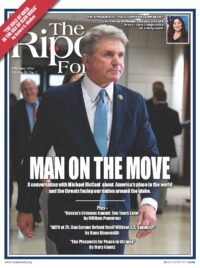 President Biden’s campaign plans to use Obamacare as an issue against President Trump. With polls favoring Republicans on major issues, like the economy and immigration, the Biden campaign has seized on President Trump’s recent comments that Obamacare is failing and should be replaced. The media has fallen in line, suggesting Trump aims to repeal Obamacare. President Trump is right with his critique and the best, most realistic strategy would be to fix key problems with Obamacare while addressing other underlying problems with the health system that frustrate American families.
President Biden’s campaign plans to use Obamacare as an issue against President Trump. With polls favoring Republicans on major issues, like the economy and immigration, the Biden campaign has seized on President Trump’s recent comments that Obamacare is failing and should be replaced. The media has fallen in line, suggesting Trump aims to repeal Obamacare. President Trump is right with his critique and the best, most realistic strategy would be to fix key problems with Obamacare while addressing other underlying problems with the health system that frustrate American families.
To fix Obamacare, it’s important to first take stock of its three key failings. First, Obamacare worsened the quality of individual market health insurance and caused millions of people to replace better coverage with worse coverage. Obamacare substantially raised premiums and deductibles and most plans exclude top hospitals and doctors. Second, the rising costs from Obamacare led more small businesses to drop health insurance. Third, the law’s coverage expansion now costs taxpayers more than $200 billion a year — almost all of which are subsidies to health insurers — without improving health outcomes.
Obamacare worsened the quality of individual market health insurance, substantially raised premiums and deductibles, and the law’s coverage expansion now costs taxpayers more than $200 billion a year.
Both a new Congress and administration should take action to fix these problems. These fixes would be sound policy and broadly popular with Americans.
President Trump’s administration expanded access to short-term, limited-duration health insurance — much more flexible and affordable coverage which typically covers far more hospitals and doctors. The Biden administration is proposing to restrict these plans, but a second Trump administration could reverse any misguided actions that reduce families’ ability to buy these plans. A second Trump term could also work with states on expanding options through Farm Bureau health plans, which are popular coverage options available in many mid-Western states, and ensuring the reliability of health sharing plans, which avoid many of the administrative costs of health insurance.
Working with Congress, a second Trump administration could build on two options that President Trump advanced in his first term to help businesses offer coverage. President Trump’s administration opened a path for businesses to offer Association Health Plans. AHPs allow smaller businesses to form larger purchasing groups to take advantage of economies of scale and more favorable regulations to secure better, more affordable plans. Many AHPs formed under the rule, delivering quality coverage at significant cost savings. Unfortunately, the rule was invalidated by an unfriendly judge and AHPs face a hostile Biden administration that appears unsympathetic to the cost pressures facing small businesses.
President Trump’s administration also created a new way for employers to offer coverage — individual coverage health reimbursement arrangements (ICHRAs). Using an ICHRA, an employer provides a tax-free amount that employees use to buy an individual market plan. ICHRAs are essentially the 401k of health insurance. A second Trump term, potentially working with Congress, can improve on the ICHRA rule by permitting employees to purchase a broader range of plans with their contribution.
Both a new Congress and administration should take action to fix these problems. These fixes would be sound policy and broadly popular with Americans.
The most challenging Obamacare problem to fix is reorienting the enormously inefficient subsidies to health insurers — through a large Medicaid expansion (almost all expansion enrollees are in a managed care plan) and premium subsidies for individual market plans —to a more efficient use. Medicaid expansion has harmed the most vulnerable (low-income children, pregnant women, and people with disabilities) by incentivizing states to provide more services to the expansion population of able-bodied, working-age adults. Obamacare created a much higher federal payment rate for the expansion population than for the more vulnerable populations. Congressional action is needed to end this discrimination and equalize the payment rates across Medicaid enrollees within states.
The next Congress must also fix the premium subsidies, which the previous Congress unwisely expanded. Ideally, a fix would have several key components. First, it would permit enrollees an option to directly control a portion of the subsidy as a health savings account deposit to use on health care that best meets their needs. Second, it would not be inflationary, meaning that the subsidy structure would not allow insurers to increase premiums with taxpayers picking up the entire increase. Third, it would direct more of the subsidies to people with greater health care needs and less to healthy people. Fourth, it would permit enrollees to apply the subsidy to a broader set of uses and health plans.
Fixing Obamacare in these ways would expand families’ options, help small businesses offer coverage, and ensure a more efficient use of taxpayer dollars. A second Trump administration and a new Congress could also build on President Trump’s price transparency rules so American consumers and employers know prices in advance of receiving care; take on counterproductive government policies that reduce market competition, advantage big market incumbents, and increase consolidation; and ensure a permissive regulatory climate so that artificial intelligence can improve health care delivery and lower systemwide costs. These solutions would make health care more affordable and give people – not government bureaucrats – control over their care.
Brian Blase, who served as a special assistant to President Trump at the White House’s National Economic Council for economic policy, is the president of Paragon.




